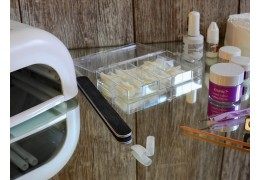Blog categories
Search in blog
Popular posts





Featured posts






For a few years now, we have been witnessing a real collective awareness of consumers around the world. These new requirements go in the direction of nature and we now want to eat healthier, dress in an eco-responsible way and apply products that respect our skin, but also the environment. For this, natural, organic and vegan cosmetics flourish on the market and it is not always easy to navigate. To make the best choice for you and the planet, see the notable differences between these three designations.
A natural cosmetic product should only incorporate components from the natural environment into its composition. It can thus include plant extracts, minerals, or be designed from animal substances such as honey for example. The problem lies in the legislation which does not regulate natural cosmetic products.

This means that you must carefully read the labels of your favourite products before you buy them to detect controversial raw materials such as paraben. Your make-up should be "paraben free" and "100% natural". Beware of statements of «natural origin» which in no way means that the product is entirely natural: it may have undergone transformations.
There is still no requirement for natural cosmetics to have a given percentage of natural ingredients. There are also none concerning the origin of these products and the design methods. We advise you to rely on the well-known brands on the make-up market, which are completely transparent about the composition and manufacture of their products.
There are currently no official regulations for organic makeup in France. The certifications we usually see are therefore private and not public. Organic products must incorporate natural components from organic farming (AB). Care should be made from controlled raw materials from a followed culture.

In addition, the packaging and container must be biodegradable. Overpacks are prohibited and must be written in an eco-friendly ink. Organic cosmetics are made according to three rules: technical commitment, ethical commitment and marketing commitment. They must meet stringent requirements such as:
A organic cosmetic product can incorporate chemical components, but only from safe ingredients (preservative, emulsifier or thickener). Products bearing the organic label must inform of their percentage of ingredients of natural and organic origin. Here are the three majority organic labels:
The purpose of this label is to control and certify producers. There has been a certification process called “Cosmos” since 2003. The latter guarantees:
This label created in 2002 has a charter guaranteeing:
This consumer association requires labeling while respecting a precise charter that guarantees:
For more information, please consult their specifications.

Vegan cosmetics should only contain raw materials of vegetable origin. Even ingredients of animal origin such as honey, wax or milk are prohibited. Keratin is vegetable and not animal and is therefore derived from wheat, soybean or corn protein. Today there are some twelve independent bodies that label vegan makeup. L
The “cruelty free” logo must appear on the products to certify that there has been no animal testing. But be careful not to confuse: This does not guarantee that the product is vegan. Vegan cosmetics are therefore not necessarily natural or organic. However, the French labels ECOCERT and Nature andamp; Progrès are organic and vegan.
It is important to know that sometimes a cosmetic called «natural» can demonstrate more requirement than an organic product. Let’s take the case of palm oil: a natural cosmetic bans it categorically, but there are no restrictions on the subject with regard to organic makeup. Your choice of natural, organic and vegan cosmetics will depend above all on your level of commitment, your personal requirements and convictions.
However, be sure to avoid buying products containing endocrine disruptors such as aluminum salts, parabens, triclosan, alkylphenols, synthetic dyes and fragrances, silicone and products from the petrochemical industry. Read your beauty product labels carefully and stay alert. If you have the slightest doubt, go to the site «the truth about cosmetics» and enter the INCI code of your product to know its exact composition.